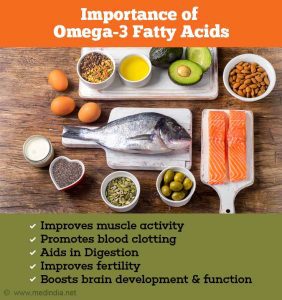Introduction
Omega-3 fatty acids are a group of essential fats that play a crucial role in our health and well-being. Often referred to as “good fats,” Omega-3s are renowned for their numerous health benefits. In this article, we’ll explore the significance of Omega-3 fatty acids, their sources, and the ways they contribute to overall health and well-being.
1. Understanding Omega-3 Fatty Acids
Omega-3 fatty acids are a type of polyunsaturated fat known for their unique chemical structure. The three most important types of Omega-3s are alpha-linolenic acid (ALA), eicosatetraenoic acid (EPA), and docosahexaenoic acid (DHA). While ALA is primarily found in plant-based sources like flaxseeds and walnuts, EPA and DHA are more commonly found in fatty fish such as salmon, mackerel, and sardines.

2. Brain Health and Cognitive Function
Omega-3s are often referred to as “brain food” for a good reason. DHA, in particular, is a major structural component of the brain, making it essential for cognitive function. Studies suggest that adequate Omega-3 intake may support memory, concentration, and overall brain health.
3. Heart Health
Omega-3 fatty acids have a well-established role in heart health. They can help reduce the risk of heart disease by lowering triglyceride levels, reducing blood pressure, and preventing the formation of blood clots. Additionally, Omega-3s may help improve cholesterol profiles.
4. Inflammation and Joint Health
Inflammation is at the root of many chronic diseases, including arthritis. Omega-3 fatty acids possess anti-inflammatory properties that can help reduce joint pain and stiffness, making them a valuable addition to the diets of individuals with arthritis and other inflammatory conditions.
5. Eye Health
DHA, a type of Omega-3, is found in high concentrations in the retina. It plays a crucial role in maintaining eye health and preventing age-related vision problems. Consuming sufficient Omega-3s may contribute to good vision throughout life.
6. Skin Health
Omega-3 fatty acids can help nourish the skin from the inside out. They support skin cell membranes, maintain moisture, and combat dryness and irritation. Regular Omega-3 consumption may result in smoother, healthier skin.
7. Mood and Mental Health
There is growing evidence that Omega-3s can have a positive impact on mood and mental health. They may help reduce the risk of depression and anxiety and even improve symptoms in those already affected by these conditions.
8. Pregnancy and Child Development
During pregnancy and breastfeeding, Omega-3s are essential for the baby’s brain and eye development. Pregnant and nursing mothers should ensure they get an adequate intake of these fatty acids to support their child’s growth.
9. Sources of Omega-3 Fatty Acids
To reap the benefits of Omega-3 fatty acids, it’s important to include them in your diet. The primary sources of Omega-3s include fatty fish like salmon, mackerel, and sardines. For vegetarians and vegans, plant-based sources like flaxseeds, chia seeds, and walnuts offer ALA. Additionally, Omega-3 supplements are available for those who may have dietary restrictions or find it challenging to consume enough from food sources.
10. Choosing the Right Omega-3 Supplements
When selecting Omega-3 supplements, it’s important to consider the type of Omega-3 (EPA, DHA, or ALA) and the source. Fish oil supplements are rich in EPA and DHA, while flaxseed oil and algal oil supplements are suitable for those seeking plant-based options. Quality and purity are also essential, so look for reputable brands that adhere to rigorous testing and quality standards.

11. Balancing Omega-3 and Omega-6 Fatty Acids
Balancing Omega-3 and Omega-6 fatty acids is key to overall health. While Omega-3s have anti-inflammatory properties, Omega-6s are pro-inflammatory. It’s important to maintain a healthy ratio between the two. Reducing the intake of processed and fried foods, which are high in Omega-6s, and increasing Omega-3-rich foods can help achieve this balance.
Conclusion
Omega-3 fatty acids are a vital component of a healthy diet, offering a wide range of benefits for overall health and well-being. From supporting heart health and brain function to reducing inflammation and promoting healthy skin, the significance of Omega-3s in our lives cannot be overstated. By incorporating Omega-3-rich foods into our diet or considering high-quality supplements, we can tap into the remarkable potential of these “good fats” to enhance our quality of life.












